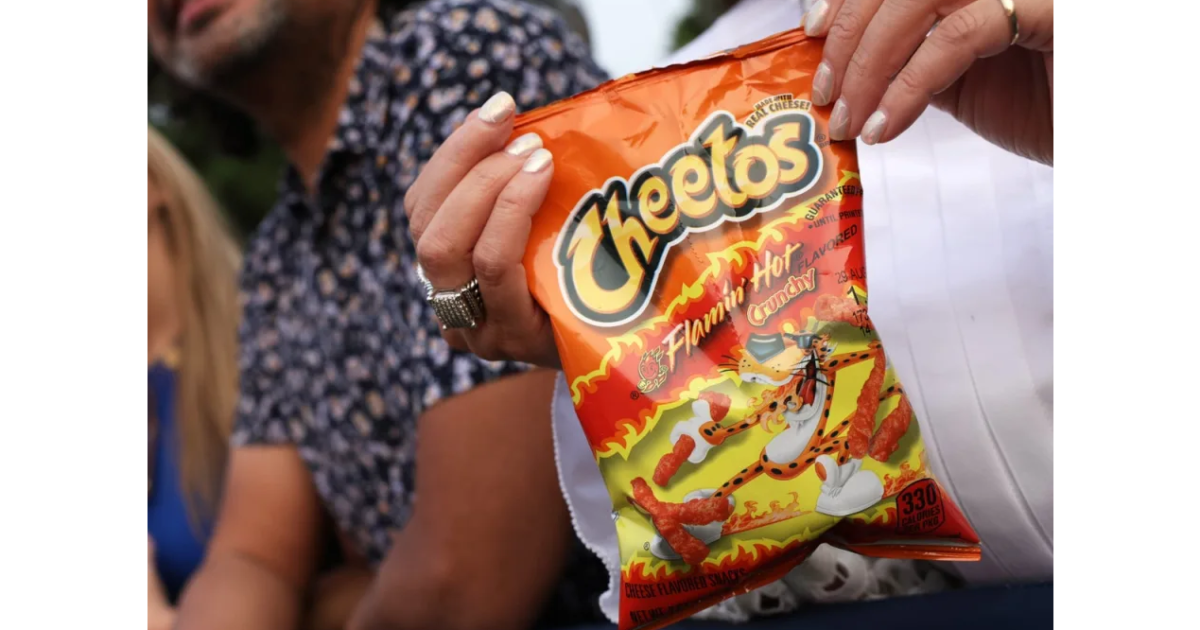
A California law was passed last year banning chemicals found in Skittles. The same legislator is now pushing to ban certain food dyes in schools.
Snacks like Flamin’ Hot Cheetos, Doritos, and Takis may make the ban list shortly.
A bill to remove artificial ingredients from schools, such as red 40, blue 1, and titanium dioxide, has been proposed in the California State Assembly.
Cheetos varieties, including the popular and spicy Flamin’ Hot version, and other chips such as Doritos include colorings red 40, yellow 5 and yellow 6 – all on the list of ingredients that would be banned if the bill is enacted. Cereals like Froot Loops and Fruity Pebbles also include these yellow and red dyes as well as blue 1. Candies like Jolly Ranchers also contain these ingredients.
Some soups, mac and cheese brands and other foods can contain titanium dioxide, according to the Center for Science in the Public Interest, which has long advocated for the banning of foods with the substance and synthetic dyes.
In existing California law, the state’s education department must uphold nutritional guidelines when serving food on campus. Free lunch and breakfast is available to all all students kindergarten through 12th grade in the state.
The current rules state foods given to students must be a fruit, vegetable, dairy, protein or whole grain item. The rules also set standards for calories, sugars and fats in these foods.
Jesse Gabriel, a Democrat, is seeking to amend the rules to prohibit all schools from selling or providing foods containing blue 1, blue 2, green 3, red 40, titanium dioxide, yellow 5, and yellow 6.
Today, I was proud to join celebrity chef @tomcolicchio and public health experts to introduce #AB2316, legislation banning 7 harmful chemicals linked to serious health concerns including DNA damage, cancer, hyperactivity, and neurobehavioral issues from food served to students. pic.twitter.com/SybexzSWRZ
— Asm. Jesse Gabriel (@AsmJesseGabriel) March 12, 2024
According to a 2012 study by the National Institutes of Health, red 3 causes cancer in animals, and yellow 5 and 6 are contaminated with carcinogens such as benzidine.
There is evidence that blue 1, red 40, yellow 5, and yellow 6 cause hypersensitivity – excessive immune responses to allergens – and yellow 5 has been shown to cause genotoxicity, which can lead to cancer in rodents per the study done by NIH.
NIH recommended that since these dyes don’t improve nutrition of foods, they should be removed. They said, however, more toxicity testing is required.
The Food and Drug Administration approves the use of dyes in foods and requires evidence that a color additive is safe before being added to products. It also requires manufactures to include on product labels which of these ingredients are used.
The administration has sent out warning letters when dye usages were not disclosed – like when yellow 6 in dehydrated papaya or blue 1 in noodle products were undeclared. They have a list of products have have received warnings for not declaring use of these ingredients.
According to CBS San Francisco, California was the first state to ban four food additives – red dye no. 3, potassium bromate, brominated vegetable oil, and propylparaben.

